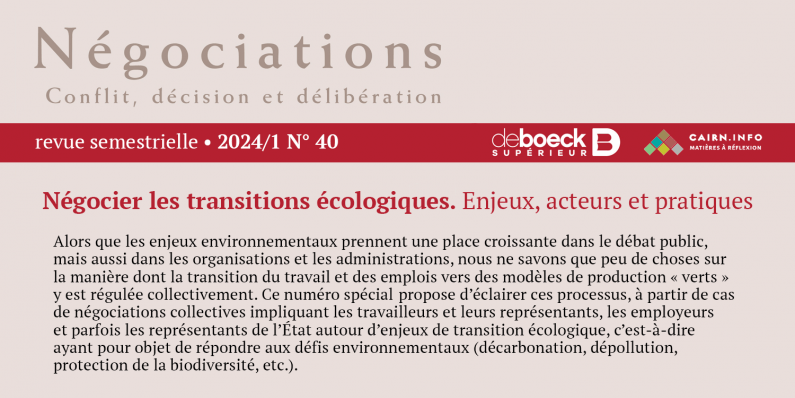Négociations Journal : Negotiating Ecological Transitions: Issues, Actors, and Practices
Camille Dupuy & Vincent Pasquier
Négociations, 2024/1 (N° 40), 144 pages, De Boeck Supérieur
While environmental issues are increasingly being debated in the public sphere, in corporations and public administrations, we still largely ignore how the impacts of the ‘green’ transition on work and employment are being negotiated collectively. This special issue seeks to shed some light on these processes. It showcases studies of collective bargaining around the ecological transition, understood as the negotiation between workers and their representatives, employers and sometimes the state in order to tackle environmental challenges (decarbonisation, depollution, protection of biodiversity, etc.). In so doing, this special issue aims to contribute to academic discussions at the intercept of labour and environmental studies to ‘provide a critical analysis of the way in which production in the broad sense creates and destroys environments, and of the way in which workers can act on these processes in order to identify and promote solutions’ (Räthzel et al., 2021).
The typology presented in the introductory article constitutes a first proposal for organising the literature on ecological negotiation; we expect that it will be discussed, amended and completed based on new work. The four articles in this special issue (two in French and two in English) highlight the multiple facets of these different types of negotiations. They offer a wide variety of empirical backgrounds in terms of countries (France, Canada, Spain, the Czech Republic, Germany), industries (health, automotive, steel, coal…) and context (public and private sectors). Their valuable insights allow us to transcend the inherent limitations of the current typology by illuminating the complexity, dynamism and adaptability of green negotiation processes.
This special issue of Négociations thus provides a preliminary overview of ecological bargaining organisations and calls for additional empirical and theoretical investigation on this topic. It aims to explore the ability of industrial relations actors to act collectively, whether in a consensual or conflictual manner, towards a just ecological transition – i.e. one that reduces social and environmental costs for less-endowed workers. It also calls for these reflections to be broadened to other geographical areas (particularly the Global South) and to other institutional contexts.



